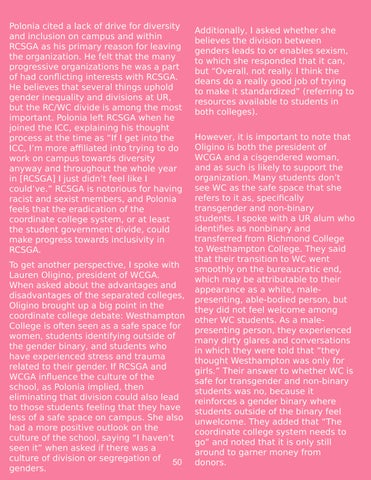Polonia cited a lack of drive for diversity and inclusion on campus and within RCSGA as his primary reason for leaving the organization. He felt that the many progressive organizations he was a part of had conflicting interests with RCSGA. He believes that several things uphold gender inequality and divisions at UR, but the RC/WC divide is among the most important. Polonia left RCSGA when he joined the ICC, explaining his thought process at the time as “If I get into the ICC, I’m more affiliated into trying to do work on campus towards diversity anyway and throughout the whole year in [RCSGA] I just didn’t feel like I could’ve.” RCSGA is notorious for having racist and sexist members, and Polonia feels that the eradication of the coordinate college system, or at least the student government divide, could make progress towards inclusivity in RCSGA. To get another perspective, I spoke with Lauren Oligino, president of WCGA. When asked about the advantages and disadvantages of the separated colleges, Oligino brought up a big point in the coordinate college debate: Westhampton College is often seen as a safe space for women, students identifying outside of the gender binary, and students who have experienced stress and trauma related to their gender. If RCSGA and WCGA influence the culture of the school, as Polonia implied, then eliminating that division could also lead to those students feeling that they have less of a safe space on campus. She also had a more positive outlook on the culture of the school, saying “I haven’t seen it” when asked if there was a culture of division or segregation of 50 genders.
Additionally, I asked whether she believes the division between genders leads to or enables sexism, to which she responded that it can, but “Overall, not really. I think the deans do a really good job of trying to make it standardized” (referring to resources available to students in both colleges). However, it is important to note that Oligino is both the president of WCGA and a cisgendered woman, and as such is likely to support the organization. Many students don’t see WC as the safe space that she refers to it as, specifically transgender and non-binary students. I spoke with a UR alum who identifies as nonbinary and transferred from Richmond College to Westhampton College. They said that their transition to WC went smoothly on the bureaucratic end, which may be attributable to their appearance as a white, malepresenting, able-bodied person, but they did not feel welcome among other WC students. As a malepresenting person, they experienced many dirty glares and conversations in which they were told that “they thought Westhampton was only for girls.” Their answer to whether WC is safe for transgender and non-binary students was no, because it reinforces a gender binary where students outside of the binary feel unwelcome. They added that “The coordinate college system needs to go” and noted that it is only still around to garner money from donors.












